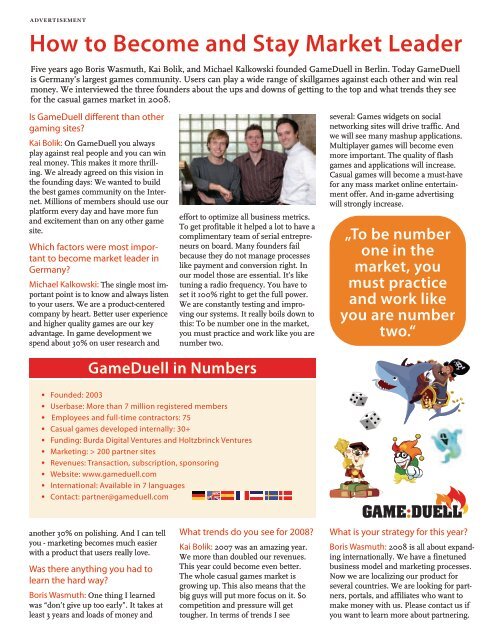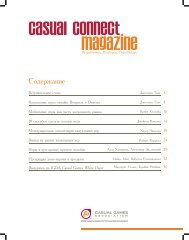Download .pdf - magazine & cover archive - Casual Connect
Download .pdf - magazine & cover archive - Casual Connect
Download .pdf - magazine & cover archive - Casual Connect
Create successful ePaper yourself
Turn your PDF publications into a flip-book with our unique Google optimized e-Paper software.
advertisement<br />
How to Become and Stay Market Leader<br />
<br />
<br />
<br />
<br />
Is GameDuell dierent than other<br />
gaming sites?<br />
Kai Bolik:<br />
<br />
<br />
<br />
<br />
<br />
<br />
<br />
<br />
<br />
Which factors were most important<br />
to become market leader in<br />
Germany?<br />
Michael Kalkowski:<br />
<br />
<br />
<br />
<br />
<br />
<br />
<br />
<br />
<br />
<br />
<br />
<br />
<br />
<br />
<br />
<br />
<br />
<br />
<br />
<br />
GameDuell in Numbers<br />
. Founded: 2003<br />
. Userbase: More than 7 million registered members<br />
. Employees and full-time contractors: 75<br />
. <strong>Casual</strong> games developed internally: 30+<br />
. Funding: Burda Digital Ventures and Holtzbrinck Ventures<br />
. Marketing: > 200 partner sites<br />
. Revenues: Transaction, subscription, sponsoring<br />
. Website: www.gameduell.com<br />
. International: Available in 7 languages<br />
. Contact: partner@gameduell.com<br />
<br />
<br />
<br />
What trends do you see for 2008?<br />
<br />
<br />
<br />
<br />
<br />
<br />
<br />
<br />
<br />
<br />
„To be number<br />
one in the<br />
market, you<br />
must practice<br />
and work like<br />
you are number<br />
two.“<br />
What is your strategy for this year?<br />
Localization<br />
A Key Element in Successful <strong>Casual</strong> Games<br />
Localization is often an afterthought<br />
in game development, a small issue that<br />
needs to be addressed after the game has<br />
launched—like creating a special version<br />
for a minor portal or fixing a Win ME bug.<br />
Overlooking localization, however, is one of<br />
the biggest mistakes casual game developers<br />
continue to make. We have found that<br />
strong localization easily can more than<br />
double revenue and, more importantly, can<br />
mean the difference between creating a hit<br />
or just another top-100 game.<br />
With product in over 30 countries and<br />
games translated into 17 languages, we have<br />
seen almost everything there is to see in<br />
localization and translation of games, and it<br />
is not pretty. Literally hundreds of developers<br />
and publishers are leaving thousands of yen,<br />
euros, dollars, and hryvnia on the table by not<br />
spending a little bit more time on localization<br />
from the project inception.<br />
Why Build for Localization?<br />
We can sum up the argument in favor of<br />
localization with one word: revenue. By<br />
focusing on localization at an early stage,<br />
our company now generates more than<br />
60 percent of its revenue outside of North<br />
America. But localization is not merely<br />
for those hoping to distribute their games<br />
outside of the United States; more than<br />
50 percent of casual games have some<br />
development done in Western and Eastern<br />
Europe (including the former Soviet<br />
Union). Although these games are usually<br />
in English (of varying levels of quality), they<br />
are usually not fully “Americanized”—that<br />
is, adapted to the U.S. market.<br />
When the poor quality of the language<br />
interrupts the fantasy of a game, the player<br />
is less likely to continue playing—and much<br />
less likely to buy. That phenomenon is true<br />
regardless of the language—which is why<br />
it is imperative that the localization makes<br />
players feel like they are playing a locally<br />
created game, even if it was developed<br />
thousands of miles away.<br />
How to Build for Localization<br />
It is essential to incorporate localization<br />
into product development from the<br />
very beginning in order to minimize the<br />
long-range costs and speed up the overall<br />
process. It is much more cost-effective<br />
and efficient to localize a game when easy<br />
localization is built into the programming<br />
as opposed to when an existing title must<br />
be reengineered. In our experience,<br />
localizing a game as an afterthought often<br />
more than triples the cost of localization<br />
and delays the releases in other languages<br />
by months.<br />
When planning for localization, the goal<br />
should be a near simultaneous launch of<br />
an English version along with versions in<br />
other FIGS languages (French, Italian,<br />
German, and Spanish, at a minimum). In<br />
our experience, sales may increase 40–50<br />
percent if all localized and U.S. versions are<br />
released simultaneously.<br />
There are many key issues to consider when<br />
designing for easy localization. To guide<br />
those responsible for localization, we have<br />
identified the following as crucial to success.<br />
If you are a producer or project lead tasked<br />
with overseeing a localization project, this<br />
list will help you make sure that your team<br />
avoids any potentially costly mistakes.<br />
Key Localization Issues:<br />
• Avoid hard-coding or embedding<br />
localizable elements.<br />
• Keep all of the assets used to create<br />
the product (including box art, logos,<br />
screenshots, and sales sheets) in one<br />
place where they are readily accessible.<br />
These assets will be crucial in producing<br />
localized versions of the product.<br />
• Record and keep separate files for voice,<br />
sound effects and background music.<br />
“<br />
Lloyd Melnick &<br />
Dimitri Kirin<br />
We have found that<br />
strong localization<br />
easily can more than<br />
double revenue.<br />
”<br />
• Create code that will allow you to add<br />
subtitles to your game for smaller markets<br />
where dubbing is prohibitively expensive.<br />
• Avoid references to country-specific<br />
currency, institutions, and themes.<br />
• Keep an accurate word count on spoken<br />
words, text files, and bit-mapped text.<br />
• Make buffers large enough to hold<br />
translated text.<br />
• Isolate localizable resources.<br />
• Ensure all symbols and icons convey the<br />
same meaning regardless of language.<br />
• Ensure that menu and dialog<br />
accelerators are unique.<br />
Design and Production<br />
• Allow users to enter text, accelerators,<br />
and shortcut-key combinations using<br />
international keyboard layouts.<br />
• Confirm that sorting and case conversion<br />
are culturally accurate.<br />
• Ensure that the game responds<br />
to changes in the control panel’s<br />
international/locale settings.<br />
• Ensure that the game works correctly on<br />
different types of hardware, particularly on<br />
hardware that is sold in the target market.<br />
• Inasmuch as language can affect<br />
the length of some .WAV files, note<br />
the length of each one in a separate<br />
document.<br />
Was there anything you had to<br />
learn the hard way?<br />
Boris Wasmuth:<br />
<br />
Kai Bolik:<br />
<br />
<br />
<br />
<br />
<br />
<br />
Boris Wasmuth:<br />
<br />
<br />
<br />
<br />
<br />
<br />
• For all screens that have bit-mapped text,<br />
save two versions: one with the text and<br />
one without it.<br />
• Support multiple-byte languages (e.g.,<br />
Japanese, Mandarin) and avoid engines<br />
that do not support these fonts.<br />
• If recordings are involved, make sure<br />
the speakers are from the region of<br />
the country with the lowest perceived<br />
accents.<br />
<br />
1 <strong>Casual</strong> <strong>Connect</strong> Magazine<br />
<br />
<strong>Casual</strong> <strong>Connect</strong> Magazine 1



